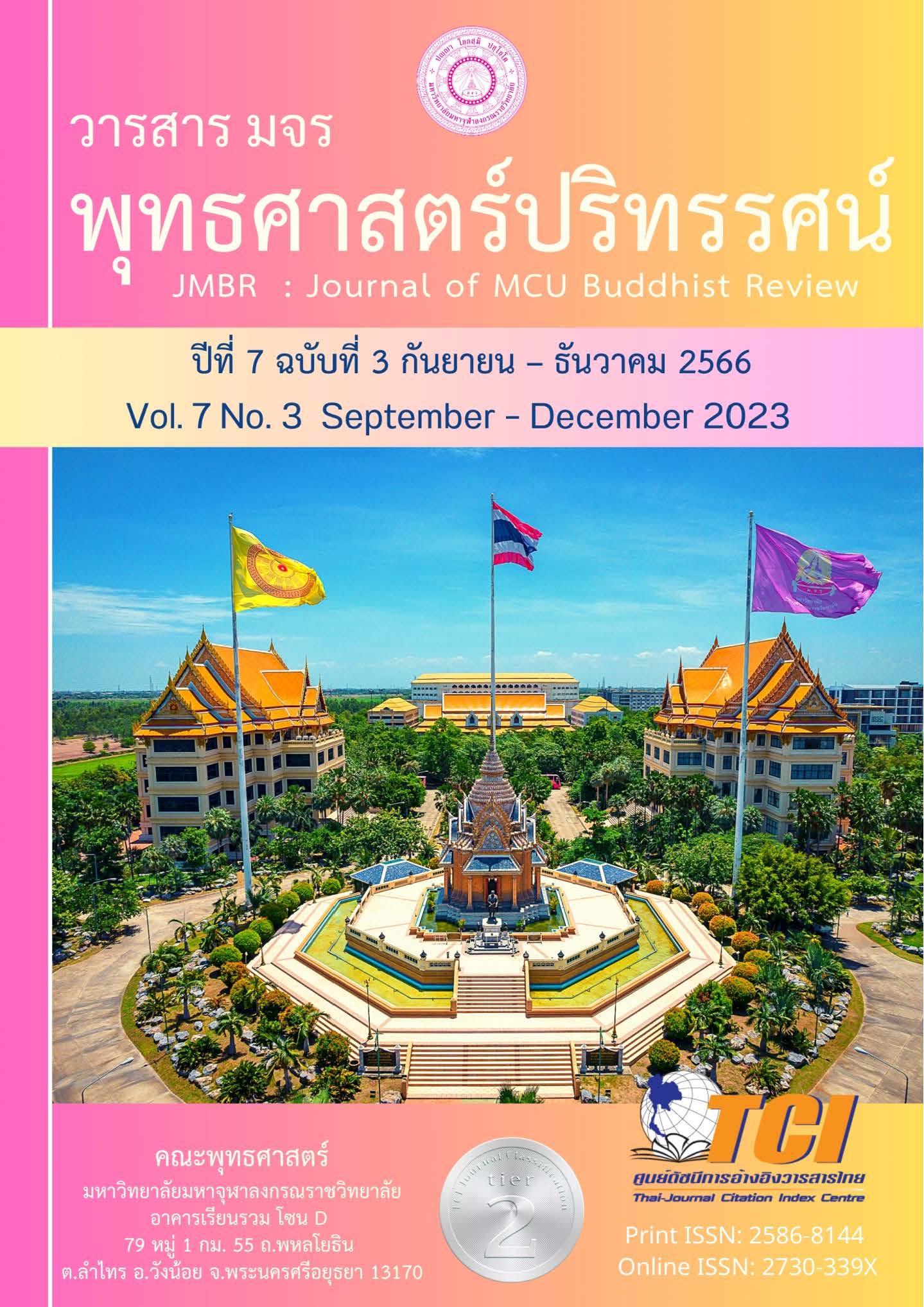มโนทัศน์เรื่องมิตรภาพในมุมมองปรัชญาศาสนากับการสร้างสังคมสันติสุข
Main Article Content
บทคัดย่อ
บทความวิจัยนี้มีวัตถุประสงค์ 1) เพื่อศึกษาแนวคิดเรื่องมิตรภาพและหลักการสร้างสังคมสันติสุขในมุมมองพระพุทธศาสนา ศาสนาคริสต์ ศาสนาฮินดูและศาสนาอิสลาม 2) เพื่อวิเคราะห์รูปแบบกระบวนการสร้างมิตรภาพและสังคมสันติสุขในมุมมองพระพุทธศาสนา ศาสนาคริสต์ ศาสนาฮินดูและศาสนาอิสลาม 3) เพื่อเสนอกลไกการสร้างมิตรภาพและสังคมสันติสุขตามมุมมองศาสนา การวิจัยนี้เป็นการวิจัยเชิงคุณภาพและสัมภาษณ์ความคิดเห็นจากผู้เชี่ยวชาญในศาสนาที่เกี่ยวข้อง
ผลการวิจัยพบว่า 1) แนวคิดเรื่องมิตรภาพและหลักการสร้างสังคมสันติสุขในมุมมองพระพุทธศาสนา ศาสนาคริสต์ ศาสนาฮินดูและศาสนาอิสลามล้วนชี้ไปที่ การพิจารณาความหมายมิตรภาพนั้นได้สร้างศีลธรรมแกนกลาง มุ่งไปที่ประเด็นเหล่านี้ คือ (1) หลักความเป็นมนุษย์ (2) การยอมรับความหลากหลาย (3) มนุษย์ผู้มีคุณธรรม 2) การวิเคราะห์รูปแบบกระบวนการสร้างมิตรภาพและสังคมสันติสุขในมุมมองศาสนาพบว่า ก. การเข้าใจกัน ข. วิธีการแก้ไขปัญหาความขัดแย้ง ค. การสร้างสังคมอุดมคติ ง. การสร้างความเกี่ยวข้องและสัมพันธ์กัน ง. ความอ่อนน้อมถ่อมตน จ. การยอมรับค่าสากลทางสังคม ฉ. สร้างสังคมพหุวัฒนธรรม และเป้าหมายของสังคมสันติสุขที่เกิดขึ้นจะมีรูปแบบ ดังนี้ ก. สังคมที่มีความเสมอภาค ข. สังคมที่มีความเข้าใจกันและกัน ค. สังคมแห่งการให้เกียรติกัน ง. สังคมที่มีคุณธรรม จ. สังคมที่มีสัมพันธ์และเกี่ยวข้องกัน ฉ. สังคมที่ไม่มีศัตรู ช. สังคมมีความเท่าเทียม ซ. สังคมพหุวัฒนธรรม ฌ. สังคมอุดมคติ 3) กลไกการสร้างมิตรภาพและสังคมสันติสุขตามมุมมองศาสนา พบว่า การสร้างมิตรภาพและสันติสุขผ่านมุมมองศาสนาเชิงปฏิบัติแสดงให้เห็นผลกระทบทางด้านมุมมองและการเงื่อนไขทางสังคมที่มีหลักการทางศาสนาเป็นรากฐาน คือ 1) ข้อเสนอมิตรภาพและสังคมสันติสุขของแต่ละศาสนา ได้สร้างผลกระทบต่อ ก. ความคิดของศาสนาคริสต์ ข. อุดมการณ์ของพระพุทธศาสนา ค. วิถีชีวิตของศาสนาฮินดู และ ง. วัฒนธรรมของศาสนาอิสลาม และ 2) ข้อเสนอมิตรภาพและสังคมสันติสุขของทุกศาสนาในภาพรวม เป็นการแสดงหาคุณค่ารวมกัน คือ ก. ผลกระทบความคิดเรื่องความไม่มีตัวตน ข. ผลกระทบต่อคุณค่าหลัก และ ค. ผลกระทบต่อการแก้ปัญหาความขัดแย้ง
Article Details

อนุญาตภายใต้เงื่อนไข Creative Commons Attribution-NonCommercial-NoDerivatives 4.0 International License.
- บทความที่ได้รับการตีพิมพ์เป็นลิขสิทธิ์ของวารสาร มจร พุทธศาสตร์ปริทรรศน์
- ข้อความใดๆ ที่ปรากฎในบทความที่ได้รับการตีพิมพ์ในวารสาร ถือเป็นความรับผิดชอบของผู้เขียนบทความ และข้อคิดเห็นนั้นไม่ถือว่าเป็นทัศนะและความรับผิดชอบของกองบรรณาธิการวารสาร มจร พุทธศาสตร์ปริทรรศน์
เอกสารอ้างอิง
ณัฐพงศ์ธัช กุรัตน์ธรรมา และคณะ. (2560). การพัฒนารูปแบบการแก้ไขปัญหาของชุมชนท้องถิ่นด้วยหลักธรรมในพระพุทธศาสนาแบบบูรณาการ. สำนักงานกองทุนสนับสนุนการวิจัย (สกว.) ฝ่ายวิจัยเพื่อท้องถิ่น.
ปัญญา เทพสิงห์และคณะ. (2562). บทบาทผู้นำศาสนาอิสลามและศาสนาพุทธต่อการเสริมสร้างความสัมพันธ์ระหว่างชาวมุสลิมและชาวพุทธในสามจังหวัดชายแดนภาคใต้. สำนักงานกองทุนสนับสนุนการวิจัย (สกว.).
ปีเตอร์ ซิงเงอร์. (2566). จริยศาสตร์ภาคปฏิบัติ. แปลโดย เหมือนมาด มุกข์ประดิษฐ์. กรุงเทพฯ: มูลนิธิเพื่อการศึกษาประชาธิปไตยและการพัฒนา (โครงการจัดพิมพ์คบไฟ).
พระคริสตธรรมคัมภีร์. (2550). พระคริสตธรรมคัมภีร์ ภาคพันธสัญญาใหม่. กรุงเทพฯ: องค์การกีเดียนส์อินเตอร์เนชั่นแนล.
พระมหาบุญเลิศ ช่วยธานีและคณะ. (2561). การผสานกลไกทางพุทธศาสนาเพื่อสร้างวัฒนธรรมการอยู่ร่วมกันอย่างสันติสุขในประชาคมอาเซียน: กรณีศึกษาไทยกับกลุ่มประเทศอินโดจีนและเมียนมาร์. สำนักงานคณะกรรมการวิจัยแห่งชาติ (วช.) และสำนักงานกองทุนสนับสนุนการวิจัย (สกว.).
มหาวิทยาลัยมหาจุฬาลงกรณราชวิทยาลัย. (2539). พระไตรปิฎกภาษาไทย ฉบับมหาจุฬาลงกรณราชวิทยาลัย. กรุงเทพฯ: มหาจุฬาลงกรณราชวิทยาลัย.
แสวง ปวงจักรทา และคณะ. (2559). การประยุกต์หลักศาสนธรรมเพื่อการฟื้นฟูการมีส่วนร่วมในกิจกรรมชุมชนของคนในหมู่บ้านใต้ร้อง. สำนักงานกองทุนสนับสนุนการวิจัย (สกว.) ฝ่ายวิจัยเพื่อท้องถิ่น.
องค์ทะไลลามะกับฟรันซ์ อัลท์. (2564). บ้านหลังเดียวของเรา: คำวิงวอนเพื่อโลกและภูมิอากาศ. แปลโดยนัยนา นาควัชระ. กรุงเทพฯ: สวนเงินมีมา.
อรชุน อัปปาดูรัย. (2562). ศีลธรรมแห่งการปฏิเสธ. แปลโดย ทศพล ศรีพุ่ม. ศาสนากับความรุนแรง. บรรณาธิการโดย ปรีดี หงษ์สต้น และอัมพร หมาดเด็น. กรุงเทพฯ: Illuminations Editions.
Dasgupta, S. (1952). A History OF Indian Philosophy Volume III. New York: Cambridge University Press.
Gulen, M.F. (2014). วิเคราะห์ชีวิตของท่านศาสดา ศาสนทูตของพระเจ้า ศาสดามุฮัมมัด. แปลโดย บรรจง บินกาซัน. Clifton: Tugha Books.
Hick, J. (1989). An Interpretation of Religion: Human Responses to the Transcendent. London: Macmillan.
Julian, L. (1949). Philosophy in Literature. New York: Syracuse University Press.Kung, H. (1990). Global Ethic for Global Politics. London: Routledge.
Schwartz, D. (2007). Aquinas on Friendship. Oxford: Clarendon Press.
Stewart, C. & Shaw, R. (1994). Syncretism Anti-syncretism: The politics of religious synthesis. London and New York: Routledge.


